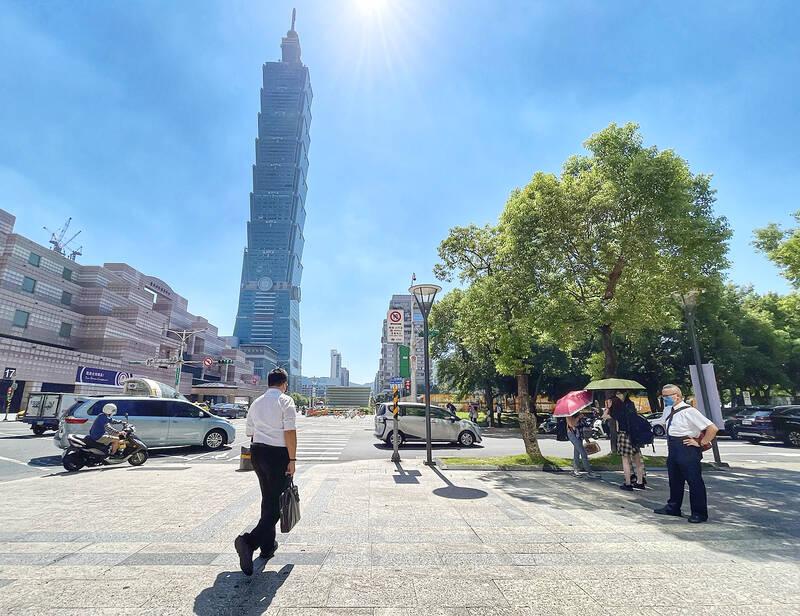Taiwan’s economy is back on track for meaningful growth next year, as exports appear set for a healthy recovery, aided by stronger activity in the tech sector despite an expected slowdown in the US and China, Taiwan Ratings Corp (中華信評) said on Thursday.
The recovery would come after several quarters of inventory adjustments for consumer electronic devices induced by sharp global inflation and monetary tightening.
“We expect Taiwan’s economic growth to be 3 percent in 2024, from 1.2 percent in 2023,” Taiwan Ratings credit analyst Lan Yu-han (藍于涵) told a press briefing in Taipei.

Photo: CNA
However, the still-sluggish global trade and subdued growth in China could constrain upside potential, particularly for commodity sectors, Lan said.
A pickup in consumer demand for technological devices and broader penetration of electric vehicles, renewable energy and artificial intelligence would lend support to GDP growth next year, she said.
Major tech firms recently offered positive business guidance for this quarter and beyond, but would maintain a cautious approach to cope with lingering uncertainty, Lan said.
Private consumption is likely to moderate over the coming year, due partly to a high base this year and expectations that the bonus from revenge consumption would lose momentum, she said.
Furthermore, Taiwanese would practice caution and slow discretionary spending in light of high prices for goods and services, she said, adding that corporate investment would remain subdued, in line with the listless global economy.
“While the worst is over for Taiwan’s export-dependent economy, we still see several global macroeconomic obstacles in the way of a more rapid growth trajectory,” Lan said.
The risks include the restructuring of global supply chains, the high interest rate environment, and geopolitical tensions, which could weigh on corporate capital expenditure plans over the next few quarters, she said.
In addition, the growth momentum of the US and China would also weigh on Taiwan's economy going forward as the two countries account for more than 50 percent of Taiwan’s outbound shipments, Taiwan Ratings said.
The US Federal Reserve on Wednesday cut its forecast of US GDP growth for next year while raising estimates for the unemployment rate. The Fed thus kept its policy rate unchanged and hinted at rate cuts next year in the absence of a recession.
China — Taiwan’s largest export destination — is being hit by deflation and capital outflows as post-COVID-19 pandemic recovery has proved weaker than expected. Its property sector poses another challenge following years of overexpansion.

In Italy’s storied gold-making hubs, jewelers are reworking their designs to trim gold content as they race to blunt the effect of record prices and appeal to shoppers watching their budgets. Gold prices hit a record high on Thursday, surging near US$5,600 an ounce, more than double a year ago as geopolitical concerns and jitters over trade pushed investors toward the safe-haven asset. The rally is putting undue pressure on small artisans as they face mounting demands from customers, including international brands, to produce cheaper items, from signature pieces to wedding rings, according to interviews with four independent jewelers in Italy’s main

Japanese Prime Minister Sanae Takaichi has talked up the benefits of a weaker yen in a campaign speech, adopting a tone at odds with her finance ministry, which has refused to rule out any options to counter excessive foreign exchange volatility. Takaichi later softened her stance, saying she did not have a preference for the yen’s direction. “People say the weak yen is bad right now, but for export industries, it’s a major opportunity,” Takaichi said on Saturday at a rally for Liberal Democratic Party candidate Daishiro Yamagiwa in Kanagawa Prefecture ahead of a snap election on Sunday. “Whether it’s selling food or

CONCERNS: Tech companies investing in AI businesses that purchase their products have raised questions among investors that they are artificially propping up demand Nvidia Corp chief executive officer Jensen Huang (黃仁勳) on Saturday said that the company would be participating in OpenAI’s latest funding round, describing it as potentially “the largest investment we’ve ever made.” “We will invest a great deal of money,” Huang told reporters while visiting Taipei. “I believe in OpenAI. The work that they do is incredible. They’re one of the most consequential companies of our time.” Huang did not say exactly how much Nvidia might contribute, but described the investment as “huge.” “Let Sam announce how much he’s going to raise — it’s for him to decide,” Huang said, referring to OpenAI

The global server market is expected to grow 12.8 percent annually this year, with artificial intelligence (AI) servers projected to account for 16.5 percent, driven by continued investment in AI infrastructure by major cloud service providers (CSPs), market researcher TrendForce Corp (集邦科技) said yesterday. Global AI server shipments this year are expected to increase 28 percent year-on-year to more than 2.7 million units, driven by sustained demand from CSPs and government sovereign cloud projects, TrendForce analyst Frank Kung (龔明德) told the Taipei Times. Demand for GPU-based AI servers, including Nvidia Corp’s GB and Vera Rubin rack systems, is expected to remain high,